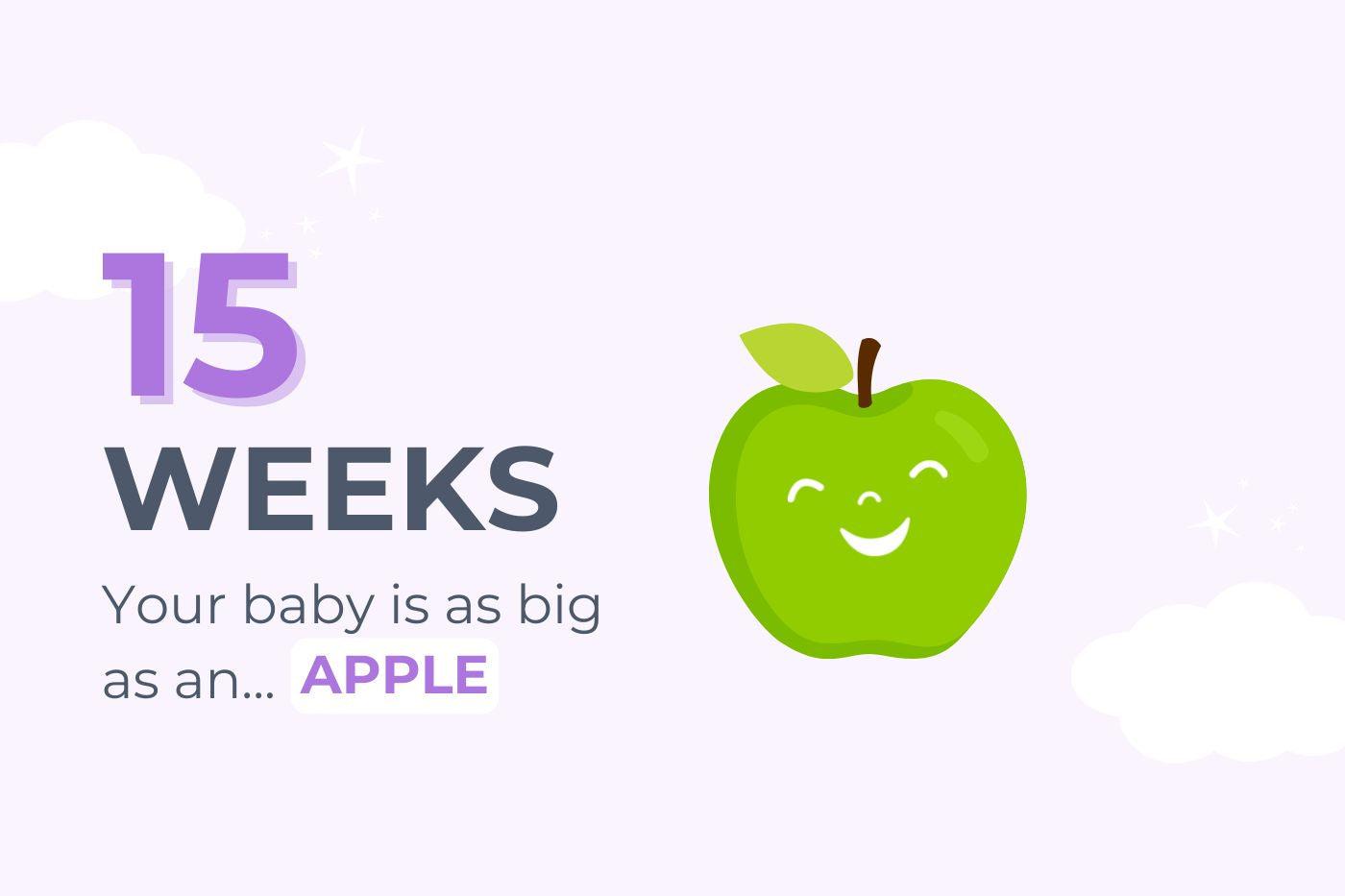PREGNANCY
15 Weeks Pregnant: Belly Pain and Bleeding Gums—Explained!
The extra hormones zooming through your system during pregnancy may have some surprising side effect

Written by
Happiest Baby Staff

15 Weeks Pregnant: Baby Update
From a teensy, cashew-shaped embryo with a tail and no eyes to a fully-formed little fetus, your baby is growing up…fast! Their skeletal system continues to form, their bones are strengthening, and they’re straightening out a little. The nerves that control the muscle movement in their arms and hands are rapidly developing and will continue to do so for the next few weeks.
Wondering if the little person in your belly is a boy or a girl? If you have a prenatal appointment this week, the ultrasound tech should be able to tell you your baby’s sex. At this point either a prostate or ovaries are already present. Fun fact: girls are born with about 1 to 2 million eggs! (Peep our gender reveal ideas!)
How Many Months is 15 Weeks Pregnant?
15 weeks pregnant is 3-1/2 months pregnant.
Baby’s Size at 15 Weeks Pregnant
At 15 weeks, your baby is the size of an apple.
15 Weeks Pregnant: What to Expect
Ouch! You may begin feeling sharp pains in your lower abdomen that feel like the side stitches you get while running. This is round ligament pain, and it occurs when the ligaments holding your uterus in place stretch to accommodate its new size and position. Round ligament pain is incredibly common in the second trimester and typically eases after week 18. If it becomes very intense or you notice it on just one side of your abdomen, talk to your healthcare provider—it could possibly be a fibroid.
The extra hormones zooming through your system during pregnancy may have some surprising side effects. You may notice your gums start to bleed after brushing or flossing. They’re more sensitive right now thanks to those hormones. Don’t let this stop you from cleaning your teeth regularly, though. Dental health is extremely important during pregnancy because gum disease is not only a concern for you, it is also linked to premature birth and low birth weight. Keep up with your normal routine…but be gentle.
Your nose may be extra stuffy right now or occasionally bleed. You guessed it—hormones are to blame for this, too. They’re sending extra blood to the mucus membranes inside your nostrils. In general, a lot more blood is pumping through your body right now, and the teeny vessels inside your nose can more easily burst due to the pressure. As with your gums, use a light touch when you blow your nose. If you have a heavy or sustained nosebleed, call your doctor.
15 Weeks Pregnant: To-Do List
- Make a dentist appointment: Pregnancy increases the risk of periodontal disease, and at-home brushing and flossing plus a professional clean will better safeguard you against dental complications. Be sure to tell your dentist that you’re pregnant and ask to put off X-rays until after the baby arrives.
- Start a baby name list: It’s time to play the name game! As you narrow down potential names for your babe-to-be you may find it helpful to write them down and practice saying them out loud. As for whether or not you reveal your baby name… that’s up to you! Some parents like to keep their choice close to the vest until baby arrives, so that they don’t get unsolicited feedback. On the other hand, you might find feedback to be helpful. Here are a few things to consider when it comes to revealing your baby’s name. Need some baby name inspiration? Check out our baby name guide!
- Moisturize your belly: Though experts say moisturizer won’t stop stretch marks (genetics, weight gain and diet all play a part), it can alleviate the itchiness that results from all that stretching. Natural oils and balms are best—and many folks swear by almond oil, shea butter, or cocoa butter.
Pregnancy Lingo Lesson: Cervical Insufficiency
At some point during your pregnancy you might might hear the term “cervical insufficiency” or “incompetent cervix”—which may sound a little insulting! But this term refers a condition some pregnant people experience.
The cervix resembles a very small, pink, puffy bagel with a tiny hole at the center. It helps to secure the baby inside of you and keeps infectious agents out. In pregnancy, the cervix is thick and long and plugged with mucus. During labor, it thins (effaces) and dilates to prep for birth. Cervical insufficiency, or an incompetent cervix, means that the cervix effaces and dilates well before you are full-term. This is a serious—but rare!—condition.
Cervical insufficiency can be hard to diagnose; oftentimes, it’s discovered only after one or more miscarriages. If you have this issue, your doctor or midwife may recommend something called cervical cerclage, which is a medical procedure that prevents the cervix from opening too soon. Otherwise, you’ll be monitored with frequent transvaginal ultrasounds.
< 14 Weeks Pregnant | 16 Weeks Pregnant >
Disclaimer: The information on our site is NOT medical advice for any specific person or condition. It is only meant as general information. If you have any medical questions and concerns about your child or yourself, please contact your health provider.
SHARE THIS ARTICLE
MOST LOVED
Sleepytime Sidekicks












